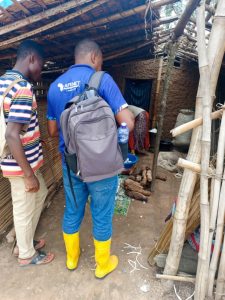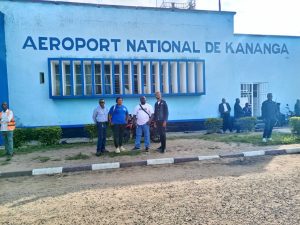AFENET, DRC’s health ministry and partners unite for urgent action against spiralling Mpox outbreak
-
by
AFENET
In the wake of an escalating Mpox epidemic in the Democratic Republic of Congo (DRC), the African Field Epidemiology Network (AFENET), in collaboration with the Ministry of Health and partners are spearheading an urgent and strategic response to contain the disease. Field epidemiologists from the AFENET Disease Detective Corps (ACoDD) have been deployed in Equateur Province with support from the Centers for Disease Control and Prevention (CDC).
Over the past decade, the DRC has battled several large scale infectious disease outbreaks ranging from Marburg Virus Disease (MVE),vaccine-derived Poliovirus, COVID-19, Measles, to Ebola virus disease, among others. Now, DRC is yet again contending with a resurgence of Mpox and measles, particularly in regions where measles response campaigns have been underway.
Mpox, a priority zoonotic disease in the DRC, is caused by a virus from the Poxviridae family, genus Orthopoxvirus. It spreads through close contact or exposure to infected fluids or objects, with symptoms ranging from high fever to characteristic vesicula-pustular rashes. Alarmingly, the mortality rate from Mpox stands at a sobering 10% in the absence of adequate management.
With two identified variants of Mpox, clades I and II, the resurgence of cases across provinces like Sankuru, Tshopo, and Equateur presents a formidable public health challenge. Equateur province alone reported a staggering 2,250 cases and 222 fatalities in 2023, emphasizing the urgent need for targeted intervention.
Dr. Alain Magazani, the AFENET Regional Technical Coordinator for the Central and Indian Ocean Francophone Region, observes that under the current circumstances, “skilled field workers are paramountand field epidemiology residents and graduates possess these essential skills to support communities and augment the Ministry of Health’s efforts.”
He explained that the response strategy involves dispatching a team of 20 ACoDD members to high-impact zones like Lotumbe, Ingende, and Bolomba. Their assignment involves active case detection, contact tracing, alert investigations, specimen collection, and bolstering infection prevention and control measures.
In addition, integration with local surveillance teams, establishment of alert systems, and daily community visits for case detection are among the proactive measures planned. Likewise, meticulous implementation and follow-up will be ensured, with ACoDD members providing regular reports to authorities and stakeholders.
The coordinated response to the Mpox resurgence signifies the unwavering commitment of the DRC government, healthcare authorities, and collaborative partners to safeguard public health and mitigate the impact of infectious diseases in the region.




